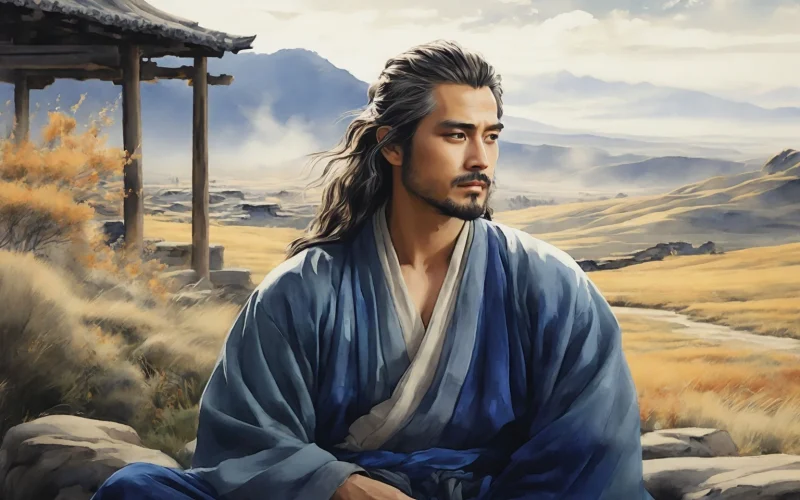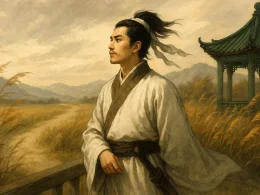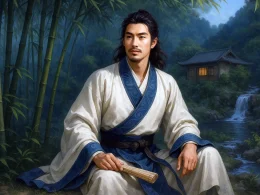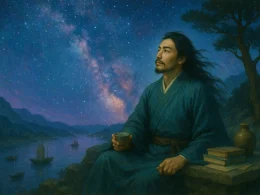Liu Guo (刘过 1154 - 1206), a native of Taihe in Jiangxi, was a ci poet of the Bold and Unconstrained School (haofang pai) during the Southern Song Dynasty. Though he remained a commoner all his life, wandering the rivers and lakes, he associated with literary giants like Lu You and Xin Qiji. His ci poetry is impassioned and heroic, and his verse is vigorous and forceful. Stylistically close to Xin Qiji but even more unrestrained, Liu Guo became a central figure among Xin’s poetic followers.
Major Works
Life
Liu Guo was born in 1154 into a humble scholar’s family. A prodigy from childhood, his unbridled temperament led him to fail the imperial examinations four times, after which he abandoned official ambitions and roamed the land as a free spirit. In 1184, the thirty-year-old Liu Guo inscribed a poem on Duojing Tower in Zhenjiang, stunning the literary world with lines like "I would pour out the snow-capped waves of three rivers / To wash away the border dust for a thousand miles." Lu You, then the leading literary figure, praised him highly, declaring his "spirit overwhelms all others; his poetry outshines his peers."
During the Shaoxi era (1190–1194), Liu Guo embarked on over a decade of travels. Crossing the Huai River northward, he visited the anti-Jin hero Xin Qiji in Chuzhou, and the two became fast friends despite their age difference. Their meeting is immortalized in Spring in a Pleasure Garden: To Xin Qiji (Qinyuanchun: Ji Xin Jiaxuan): "Drinking ale and gnawing pork shoulder, braving wind and rain to cross the river—what joy!"—lines brimming with heroic spirit. Journeying south, he debated state affairs with the thinker Chen Liang in Dongyang, both advocating resistance against the Jin Dynasty and opposing empty Neo-Confucian theorizing. In Xiangyang, he became a guest of Yue Ke, grandson of the martyred general Yue Fei, composing Song of Six States: Inscribed on the Temple of Prince E of Yue (Liuzhou Getou: Ti Yue E Wang Miao) to honor Yue Fei’s deeds. These travels greatly enriched his creative themes and cemented his bold, tragic ci style.
In 1195, Liu Guo was imprisoned in the "Jianghu Poetry Scandal," a literary inquisition orchestrated by Chief Councillor Han Tuozhou to suppress dissent. This ordeal deepened the melancholy in his ci, as seen in Congratulations to the Bridegroom: Westward with Sword in Hand (Hexinlang: Danjia Xilai Lu): "Who remembers the aging heroes south of the Yangtze? / Employed, they could have honored the Middle Kingdom."—voicing the anguish of patriots denied service. On the eve of the Kaixi Northern Expedition (1206), the ailing Liu Guo still petitioned Han Tuozhou with Strategies for Restoration, urging a pincer attack on the Jin. Yet the campaign failed, and the poet died in Kunshan at fifty-three, grieving the defeat. His final poem, On Events, declares: "This scholar seeks no golden seal of office, / Only to lead a hundred thousand troops to battle."—capturing the sorrow of unfulfilled ambition. Buried by his friend Pan Youwen at the foot of Ma’an Mountain, Liu Guo is commemorated today at the Longzhou Shrine in Kunshan.
Artistic Style
Liu Guo’s extant works include over 400 poems and ci, blending the Bold School’s grandeur with the Jianghu poets’ candor, uniquely innovative in theme and style. His literary output divides into three categories—patriotic ci, travel poetry, and satirical sketches—each groundbreaking.
- Patriotic ci represent his pinnacle. Spring in a Pleasure Garden: To Xin Qiji employs a rare prose-dialogue form, imagining a cross-temporal debate with Bai Juyi and Lin Bu, showcasing "ale and pork shoulder, braving wind and rain" heroism and pioneering *"prosifying the *ci." Song of Six States: Inscribed on the Temple of Prince E of Yue mourns Yue Fei with documentary realism: "Passing old barracks, / Jing and E still have survivors." The line "Yue died, Qin rejoiced, Zhang said nothing" encapsulates loyalty’s tragedy in nine stark characters. Congratulations to the Bridegroom: Westward with Sword in Hand compares the poet to the Warring States strategist Feng Xuan, lamenting "unremembered aging heroes" and climaxing with "A man’s deeds leave no traces— / Remember those years, singing sadly, beating the oar, / Drunk, legs sprawled defiant."—capturing Xin Qiji’s bold essence. These works transcend traditional ci, fusing national sentiment with personal plight, hailed by Yang Shen’s Comments on Ci as "Xin’s mighty successor."
- Travel poetry reveals Liu’s social web and temperament. Duojing Tower for a Certain Commissioner records his friendship with Lu You: "Heaven and earth brood over three hundred years" conveys reverence. For Chen Tongfu expresses camaraderie with Chen Liang: "A man’s deeds are measured by devotion" shares their patriotic zeal. Song of Xiangyang, for Yue Ke, laments Yue Fei: "Still the elders weep to heaven." Sincere emotions and plainspoken language lend power, as in To Xin Qiji: "This scholar seeks no marquis’ seal, / Only the king’s sword to behead steeds"—or To Wu Mingqing: "Post-separation longing fills river moonlight; / A cane supports me eastward across the bridge"—showing scholarly leisure.
- Satirical sketches critique society. Academy mocks Neo-Confucian empty talk: "All day straining one’s mind in vain— / Better sit silent and muse." Bird Speech verses parody governance; "Take Off the Cloth Pants" exposes official extortion: "Take off the cloth pants to redeem my husband— / Clerks beat and curse, demanding money." Longevity Ode for Han of Pingyuan seemingly praises Han Tuozhou but subtly admonishes: "If harvests ripen in peace, / This pedant won’t need ascetic meals." Following Bai Juyi’s New Yuefu tradition, these works reflect folk hardships in vernacular language, unique among Jianghu poets. Puppet Show skewers officialdom: "Strings and mechanisms in hand, / They sit august in caps and robes."
Artistic Innovations
Liu Guo advanced ci poetry in theme, technique, and diction, innovations rooted in his singular life.
- Thematic expansion: He broke ci’s "boudoir confinement," writing military strategy (Spring in a Pleasure Garden: Autumn Review by Commander Zhang): "Even sands beyond the frontier, ennobled for ten thousand miles, / A seal big as a dipper couldn’t satisfy my life." Political discourse entered Congratulations to the Bridegroom: For Zhang Yangong: "Where are the heroes of antiquity?" Folk suffering infused Congratulations to the Bridegroom: "A true man’s heart is iron till death— / See my hands mend the shattered heavens." This "ci for ambition" practice masculinized the form. Moon over West River: Congratulatory Ci pioneered celebratory ci, while Spring in a Pleasure Garden: Parting treated friendship—both thematic breakthroughs.
- Technical fusion: Liu blended genres. Spring in a Pleasure Garden: To Xin Qiji’s prose-dialogue shattered ci conventions. Song of Six States adapted Records of the Grand Historian’s narrative: "Among the Restoration generals, who was the peerless hero?" Congratulations to the Bridegroom incorporated fu’s elaboration: "Remember those years, singing sadly, beating the oar." This "prosified ci" enriched expressive range, influencing later sanqu. Prelude to Water Melody: How Much Spring (Shuidiao Getou: Chunshi Neng Jixu) contrasted scenery (upper stanza) with emotion (lower); Tangduo Song: Reeds Fill the River Isle (Tangduoling: Lu Ye Man Tingzhou) juxtaposed past and present for heightened effect.
- Diction: Liu forged a "rough-hewn heroic" style. Congratulations to the Bridegroom: Aging, Xiangru Weary (Hexinlang: Lao Qu Xiangru Juan) was bluntly lyrical: "Remember painted bridges, songs of yellow bamboo, / Peach blossoms, a face." Prelude to Water Melody used colloquialism: "A cup of wine buys tomorrow’s affairs— / Sunset sent off, the moon rises again." Spring in a Pleasure Garden: Jade Belt, Golden Fish (Qinyuanchun: Yudai Jinyu) posed rhetorical questions: "Before Tianzhu Mountain, by Mirror Lake— / Who was young Master Xie?" This unvarnished, heartfelt language differed from Jiang Kui’s "clear emptiness" or Wu Wenying’s "dense gorgeousness," forging a unique aesthetic. Allusions abounded—Feng Xuan’s "sword-hilt knocking" in Congratulations to the Bridegroom, Fan Kuai’s "pork shoulder" in Spring in a Pleasure Garden—but always apt, never obscure.
Historical Impact
Liu Guo’s legacy, transmitted through the Jianghu School and later Bold ci poets, profoundly influenced Chinese literary history.
- Late Southern Song: Liu Guo, Liu Kezhuang, and Dai Fugu were the "Three Lius of Jianghu." Their "poetry as satire" creed, focusing on social realities, appeared in the Jianghu Collection. Though suppressed in the "Jianghu Poetry Scandal," this people-centered approach became a major poetic current. Fang Hui’s The Sea of Lyric Poetry praised Liu’s "unrestrained vigor, a school unto himself." Zhou Mi’s Old Tales of Qidong noted: *"Liu’s *ci* are bold, like the man."* His bond with Xin Qiji, a literary landmark, jointly advanced the Bold School.
- Yuan Dynasty: Liu’s legend grew. Jiang Zizheng’s Mountain Studio Jottings recorded his "chivalrous generosity." Old Affairs of Wulin cast him as the "mad poet-drinker" archetype. Yuan dramatists borrowed his ci, like Bai Pu’s Spring in a Pleasure Garden, clearly influenced by Liu. Ming’s Feng Menglong fictionalized him in Stories to Awaken the World as a "romantic genius," popularizing his image.
- Qing Dynasty: Critics reevaluated Liu. Chen Tingzhuo’s Rain Studio Ci Talks paired him with Xin Qiji: *"Liu’s *ci, wild yet graceful, lack Xin’s depth but stand alone." Kuang Zhouyi’s Huifeng Ci Talks noted his "indelible strangeness." Zhu Zumou, of the Late Qing Four Masters, edited Dragon Isle Ci, enshrining Liu in the ci canon. Wang Guowei’s Remarks on Song Lyrics criticized his "coarseness" but admitted his "heroic air."
- Modern Scholarship: Liu is reinterpreted. Qian Zhongshu’s Selected Song Poetry called his verse "spirited but unrefined." Xia Chengtao’s Chronicles of Tang-Song Ci Poets detailed his ties to Xin’s circle. Japanese scholar Murakami Tetsumi deemed him "Xin’s school in practice." Post-1980s studies deepened: Wang Shuizhao’s General Theory of Song Literature analyzed his "Jianghu knight-poet" persona; Shen Songqin’s Southern Song Literati and Factionalism examined his politics. Stephen Owen’s Cambridge History of Chinese Literature treats Liu as a Jianghu exemplar.
- Contemporary Culture: Liu’s image thrives. His Kunshan tomb became a Jiangsu cultural site in 2002; Taihe built Longzhou Cultural Plaza; his Spring in a Pleasure Garden was set to music. Martial arts novels reference him—Jin Yong’s Legend of the Condor Heroes names a character "Ke Zhen’e" after him; Liang Yusheng’s Romance of the White-Haired Maiden echoes his verse. These adaptations renew his legacy.
The Siku Quanshu appraisal remains definitive: *"Liu’s poetry is somewhat rough but brilliantly talented, a master of his age. His *ci, deriving from Xin Qiji, surge with passion, slightly altering Xin’s style." This "sword-blade and flute-heart" scholar, with his "wild but not unruly, heroic but not crude" art, left an indelible mark. From Taihe’s humble scholar to Jianghu’s wandering master, Liu Guo’s brief, blazing life sang a scholar’s heroic ode.































